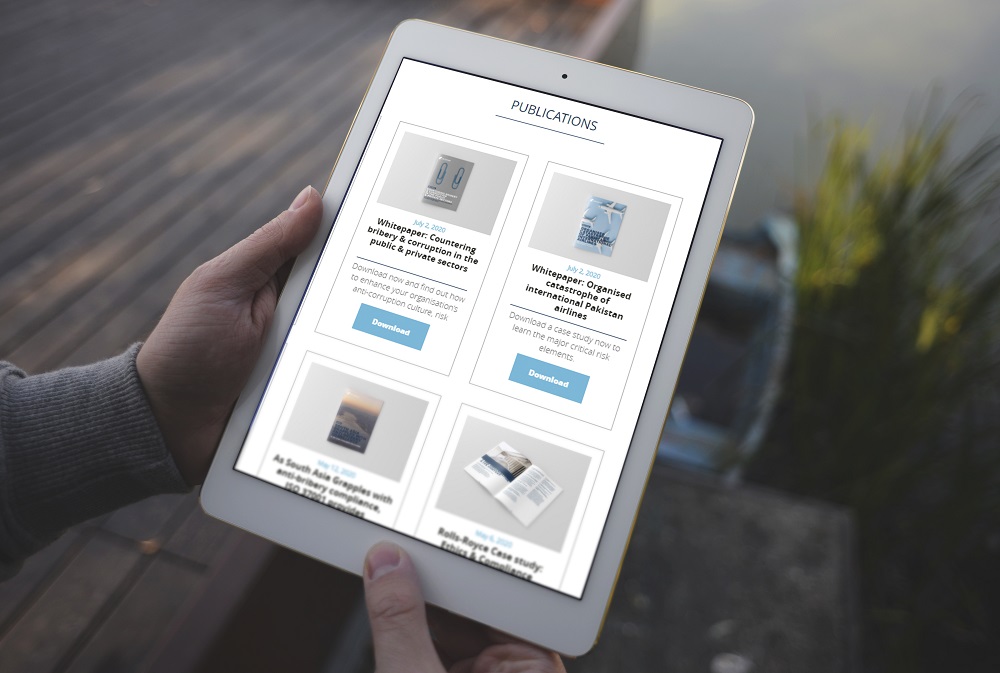Fraud and corruption are always evolving. Changes in methods, technology and other factors make it critically important those trying to prevent and detect it to evolve, as well. Part of that process is to analyse fraud, corruption, bribery, money laundering and other crimes through the lense of research and casework. When experts share their findings and their knowledge into the numerous laws and regulations that address fraud, everyone benefits – especially vulnerable businesses and other organisations. CRI Group has recently published three new whitepapers that provide insightful looks into issues at the forefront of fraud and corruption today. They range from deep dives into the U.S., U.K. and other anti-fraud and anti-corruption laws around the world, to close examinations of actual fraud cases that hold lessons for all of us. We invite you to download these whitepapers and increase your knowledge of fraud, corruption, proper compliance, risk assessments, due diligence and more.
1. “The Catalysts for Economic Crime: An Investigative Study Into Causal Factors of the Perpetration of Transnational Financial Crimes”
This whitepaper provides an in-depth study of transnational financial crimes and the national laws and regulations that govern them. Laws in the U.S. and the U.K, in particular, are compared and examined in terms of effectiveness in preventing financial crimes.
The comparative study focuses on corporate fraud. “The Catalysts for Economic Crime” pursues the question as to how weaknesses in national laws can be considered “a core causal factor in the perpetration of transnational financial crimes.” Readers will learn about the need to strengthen such laws or risk continued and increased criminal activity.
Different types of financial crimes are examined, including money laundering, due to its prominence as a form of transnational financial crime. The research provides a detailed discussion of the inadequacies in current national laws, and proposes solutions through increased accountability, compliance-focused on self-governance and heightened monitoring for violations, among other important considerations. Download the whitepaper for free.
2. “Countering Bribery & Corruption in the Public & Private Sectors: Anti-Corruption Culture, Risk Assessment, Auditing & Compliance”
This publication provides an insightful look at the responsibility of corporations to monitor and mitigate risks. This whitepaper examines two high profile corruption cases, Airbus and Rolls-Royce, to provide a deeper understanding of how bribery and other financial crimes can take root at organisations without proper prevention procedures and inadequate controls.
The global nature of the enterprise that makes corruption even more prevalent in modern times also makes prevention more difficult. When it comes to putting procedures in place to prevent bribery and corruption, “the concept of ‘adequate procedures’ is “vulnerable to interpretation depending upon national or industrial jurisdiction … and many enforcement agencies and government authorities have failed to provide guidance regarding the definition of ‘adequate procedures’ as it shapes both Anti-Corruption guidelines and legal defence.
Case studies often provide an extremely effective way of demonstrating the effect of inadequate controls and procedures when it comes to corruption. In the cases of Airbus and Rolls-Royce, the financial crimes and their ramifications were significant. Airbus committed to financial penalties of $4 billion; a system of “intermediary leverage” involved hundreds of its agents in 16 countries “to encourage national and airline purchase of the company’s civilian aircraft and satellites.” In the case of Rolls-Royce, a four-year investigation uncovered corruption, false accounting and failure to prevent bribery, leading to fines in excess of ?497.2 million – which accounted for approximately 3.4% of Rolls-Royce’s revenues for 2016. Find out what can be learned from these cases and how proper controls could have prevented them. Download the whitepaper for free.
3. “Organised Catastrophe of Pakistan International Airlines: Major Critical Risk Elements – Mismanagement – Corruption”
This whitepaper provides another case study, this one a close examination of Pakistan International Airlines (PIA) which has been embroiled in a scandal. The cases of professional fraud involve fake degrees and fraudulent licenses, and there have been cases of air accidents with loss of lives. This white paper investigates how the PIA case is not a coincidence, but rather an “organised failure of institutional management, state, and internal controls.”
In fact, the PIA investigation comes at a time when fraud and corruption among state-owned enterprises in Pakistan and elsewhere is rising at an alarming rate. This has links to fraud in governmental institutions, and PIA is just a high-profile example of what can result when such corruption goes unchecked.
This whitepaper analyses two major risk elements at PIA, in terms of mismanagement, and corruption in the form of kickbacks. This research paper also proposes solutions for dealing with such systemic, organizational crimes, the foundation of which is to implement a business-based risk management framework. Download the whitepaper for free.
Let’s talk!
If you have any further questions or interest anti-corruption solutions, please contact us.
CRI Group has safeguarded businesses from any risks, providing investigations (i.e. insurance fraud), employee background screening, investigative due diligence, business intelligence, third-party risk management, forensic accounting, compliance and other professional investigative research services. In 2016, CRI Group launched Anti-Bribery Anti-Corruption (ABAC®) Center of Excellence – an independent certification body established for ISO 37001:2016 Anti-Bribery Management Systems, ISO 37301 Compliance Management Systems and ISO 31000:2018 Risk Management, providing training and certification. ABAC® operates through its global network of certified ethics and compliance professionals, qualified auditors and other certified professionals. Contact ABAC® for more on ISO Certification and training.



